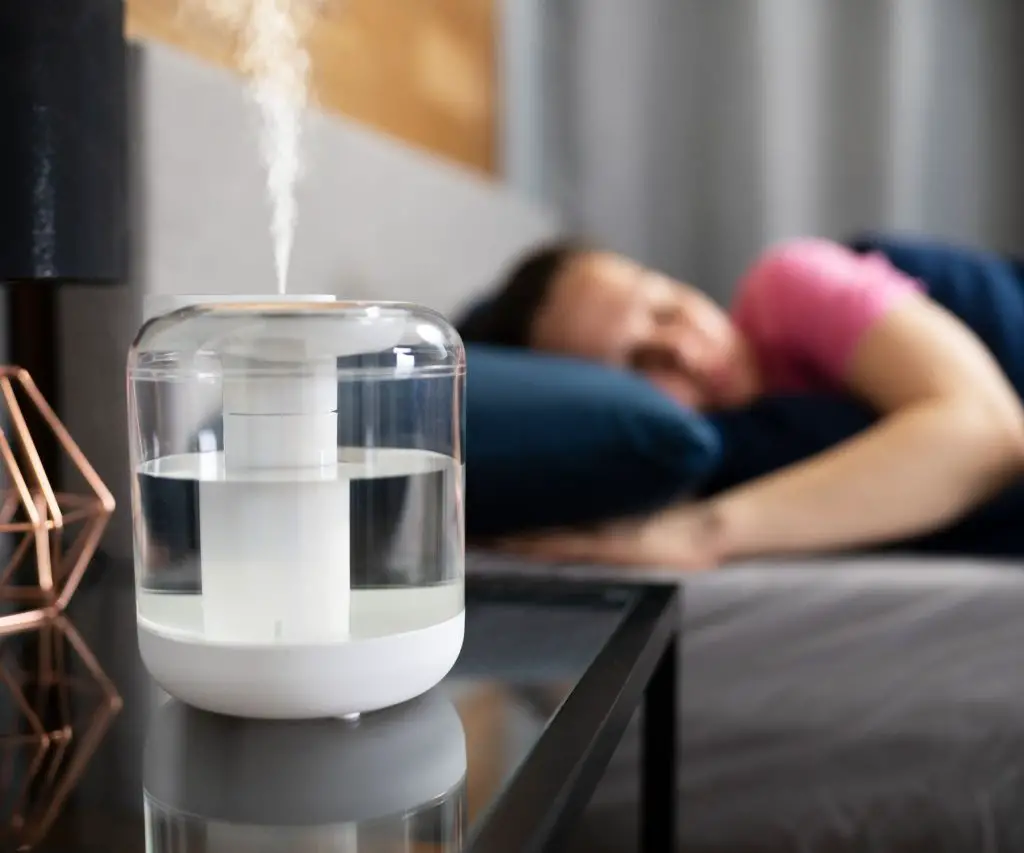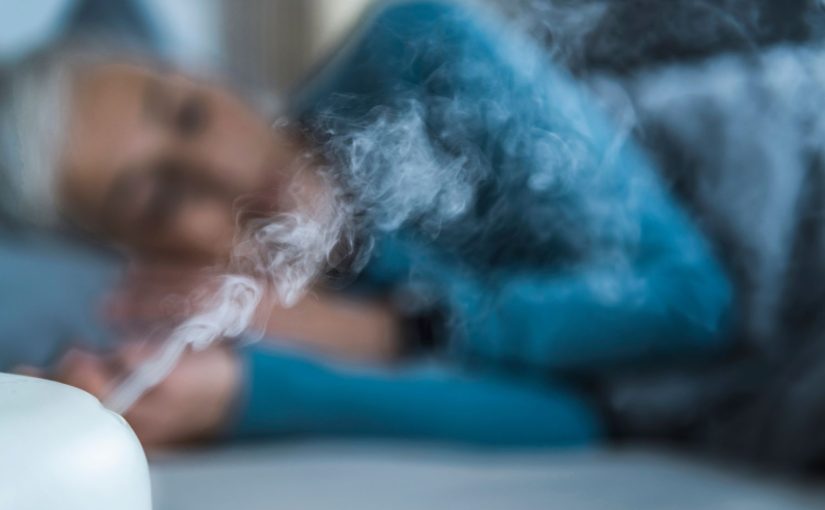Table of Contents
Can I Leave My Humidifier Running Overnight?
Yes, you can safely run a humidifier overnight as long as you take a few precautions. The key is choosing the right type of humidifier and following proper maintenance practices to prevent excess moisture and mold growth in your bedroom.
Humidifiers add essential moisture back into dry indoor air. Letting a humidifier run overnight can help relieve respiratory issues like sinus congestion, dry skin, and irritated nasal passages caused by arid winter air or summer air conditioner use. Maintaining the ideal 30-50% humidity range overnight provides the best sleeping environment.
<
| “Over-All” Best Humidifier Levoit LV600 see on Amazon |
 |
| Runner Up Dreo Smart Humidifier view Here |
 |
| #1 Anti -Microbial Mold Resistant Humidifier PureGuardian H5450BCA view on Amazon |
 |
Why Use a Humidifier While Sleeping?
Here are some of the top reasons people run a bedroom humidifier at night:
- Alleviates symptoms of colds, allergies, asthma, and sinusitis
- Prevents dry skin, cracked lips, and bloody noses
- Reduces snoring from congestion
- Lessens incidence of scratchy throats and coughs
- Helps Houseplants thrive
- Protects wood furniture and flooring from drying out
The heat from furnaces and wood stoves removes moisture from indoor air. This dry air can irritate and inflame your nasal passages, throat, lungs, and skin while you sleep. Running a humidifier restores that lost moisture to a comfortable level so you can breathe and sleep easier.
Potential Risks of All-Night Humidifier Use
While humidifiers offer many benefits, some potential risks come with leaving them running overnight unattended:
- Accumulation of mineral deposits from tap water
- Wet spots, moisture damage, and mold growth on walls or furniture
- Bacteria and mold growth inside the tank and filter
- Condensation dripping from windows and cold surfaces
- Excess humidity that creates an environment conducive to dust mites, viruses and allergens
We’ll discuss how to avoid all these potential issues later on. But first, let’s look at which types of humidifiers are safest for overnight use.
Best Humidifiers for All-Night Use
Some humidifiers are better suited and safer for running at night while you sleep. The ideal overnight humidifier will:
- Run quietly to avoid disrupted sleep
- Produce cool mist instead of hot steam
- Have an automatic shut-off to prevent overflowing
- Be easy to clean and refill
- Have adjustable humidity settings
Based on these criteria, these are the top types of humidifiers recommended for leaving on all night:
Ultrasonic Cool Mist Humidifiers
Ultrasonic cool mist humidifiers use high-frequency vibrations to create a fine invisible mist. The mist evaporates into the air quickly to raise humidity levels. They are called “cool mist” because they do not heat the water, only vibrate it.
Benefits:
- Silent operation perfect for light sleepers
- Automatic shut off when empty
- Fewer minerals deposits than warm mist options
- Safer than steam vaporizers for kids’ rooms
Just be sure to only use distilled water, not tap water which contains more minerals. And clean them thoroughly to prevent any mold growth.
Warm Mist Humidifiers
Warm mist humidifiers heat the water to create hot steam. The heat helps kill mold and bacteria that could grow in the tank. They work well to alleviate sinus congestion.
Benefits:
- Kills mold and bacteria with hot steam
- Provides temporary relief of congestion
- Uses regular tap water
Just take caution with kids in the room as the steam vapor can cause burns if touched. Place it out of reach.
Evaporative Humidifiers
Evaporative humidifiers draw dry air through a wet wick filter to add moisture. The fans then circulate the humidified air in the room. They are very affordable but require more cleaning to prevent mold in the filter.
Benefits:
- Inexpensive to operate
- Uses regular tap water
- Humidifies rooms efficiently
Downsides are the noise from the fan motor and frequent filter changes. But overall they are an effective option for overnight use.
Room Steam Vaporizers
Basic steam vaporizers that boil water to create steam should be avoided in bedrooms overnight. They pose a serious scald risk to children if accidentally tipped over. And the hot steam can damage furnishings over time. Use them with caution and only when awake to monitor.
 Safety Tips for All-Night Operation
Safety Tips for All-Night Operation
Follow these tips when running a humidifier in your bedroom overnight:
Pick the Right Spot
- Place the humidifier at least 2-3 feet from the bed and aim the mist away from bedding.
- Set it on an waterproof surface like a tray or plastic table protector.
- Keep humidifier off wood surfaces which may warp from moisture.
- Avoid plugging into an outlet right behind the bed.
Monitor the Moisture Levels
- Use a hygrometer to keep the humidity between 30-50%. Higher than 50% risks mold growth.
- Turn off the unit if moisture condenses on windows or walls.
- Run a dehumidifier during the day to balance out excess nighttime moisture.
Keep the Tank Clean
- Change water and clean the tank daily to inhibit mold growth.
- Disinfect with bleach solution weekly.
- Use distilled water to prevent mineral deposits.
- Replace filters as needed.
Air Out the Room
- Crack windows and open doors during the day to circulate fresh air.
- Dust and vacuum regularly to remove allergens.
- Wash bedding weekly to prevent dust mites.
Monitor Usage
- Turn off the humidifier if anyone wakes up coughing or wheezing.
- Listen for any strange noises which could indicate a malfunction.
- Check that auto shut-off works when tank is empty.
Ideal Humidity Levels for Sleeping
Aim to keep bedroom humidity between 30-50% for optimal sleep comfort and health:
| Humidity Range | Effects |
|---|---|
| 30-50% | Ideal for sleeping. Helps open airways. |
| 50-70% | Increased risk of condensation, mold growth and dust mites. |
| Below 30% | Dry airways, irritated respiratory passages and skin. |
Use a hygrometer placed at sleeper level to monitor the humidity. Adjust mist output on the humidifier as needed to stay in the 30-50% comfort zone overnight.
Troubleshooting Humidifiers Running Overnight
If any issues come up with your overnight humidifier, try these troubleshooting tips:
Condensation Forms on Windows
- Humidity is too high – Turn off the humidifier and open windows.
- Check for leaks allowing excess moisture to escape.
- Clean moisture off windows each morning before it causes damage.
Mold Growth in Tank or on Filters
- Clean tank and replace filters regularly.
- Use bleach solution weekly to disinfect.
- Leave tank open to fully dry between uses.
- Switch to distilled water instead of tap water.
Mineral Dust on Surfaces
- Stop using tap water and only use distilled.
- Change filters more frequently.
- Clean mineral deposits with vinegar-water mix.
Respiratory Irritation When Used
- May indicate mold growth – clean unit thoroughly.
- Check for dust mites on bedding and vacuum.
- Stop use and see if symptoms improve.
- Consult a doctor if irritation persists.
Main Points on Overnight Humidifier Safety
Here are the key takeaways on running humidifiers safely all night long:
- Choose ultrasonic cool mist or evaporative humidifiers which are designed for bedrooms.
- Maintain 30-50% humidity to balance comfort and health.
- Clean and disinfect the tank daily to prevent mold growth.
- Use distilled or filtered water instead of tap water.
- Set on a waterproof surface away from bedding and walls.
- Monitor humidity levels and watch for any condensation.
- Air out bedroom during the day to keep fresh air circulating.
Taking these precautions allows you to gain all the benefits of overnight humidification without worrying about potential downsides. Just be diligent in your maintenance routine. Check that the auto shut-off works properly. And make sure no one is showing any signs of allergy or irritation issues from its use. Enjoy restful sleep with just the right amount of moisture in the air.

